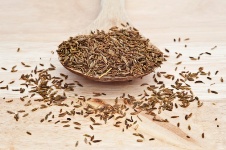 Every time you eat curries, chilis, and many other foods, including Mexican dishes like pibil and several strong-tasting European cheeses, you’re also eating a spice that can help your heart. It’s called cumin, and it’s a staple of Mexican and Indian cooking. Cumin seeds may be small, but they pack a big punch when it comes to health benefits.
Every time you eat curries, chilis, and many other foods, including Mexican dishes like pibil and several strong-tasting European cheeses, you’re also eating a spice that can help your heart. It’s called cumin, and it’s a staple of Mexican and Indian cooking. Cumin seeds may be small, but they pack a big punch when it comes to health benefits.
Cumin is one of those rare plant sources that are actually high in iron. That’s probably why it has earned a reputation as a heart-healthy food that can help stave off major complications in your circulatory system—the sorts of problems that can lead to high blood pressure, strokes, and heart attacks.
One recent study looked at black cumin—a particular type of cumin seed that has been used in folk medicine in the Middle East and some Asian countries for centuries. Throughout history, black cumin was valued for its ability to promote general good health and assist in the treatment of many ailments. The research team at the Hamad Medical Corporation in Qatar focused in on cumin’s effect on the heart. They discovered that black cumin exerts measurable benefits throughout the entire cardiovascular system.
Combine these discoveries with the fact that cumin seeds can boost the function of your digestive system, and you’ve got some pretty compelling evidence to add this food to your diet. Cumin is able to stimulate the release of certain enzymes in the pancreas that help with digestion and nutrient absorption.
Cumin seeds are easy to find—most grocery stores have them in the spice section. You can buy ground cumin or whole cumin seeds. Cumin is just one of many different spices that can be added to your diet that can help to keep your heart and digestive system functioning smoothly.
Sources for Today’s Articles:
Help Your Heart with This Flavorful Spice
Asim, M., et al., “Cardiovascular Benefits of Black Cumin (Nigella sativa),” Cardiovasc Toxicol. August 22, 2012.
